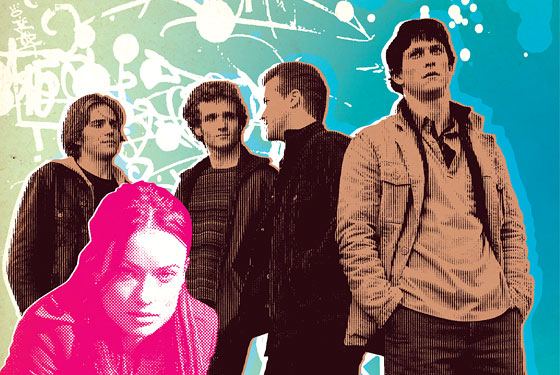
If the Donnellys were Corleones, Tommy would be Michael. Tommy (Jonathan Tucker) is the sensitive Donnelly, with so many complicated feelings that he actually goes to art school on a union scholarship. One of these feelings is love, for Jenny Reilly (Olivia Wilde) at the local diner, whose face he’s forever sketching. Another feeling is guilt, for what happened to his older brother, Jimmy, (Tom Guiry) back when they were kids in Hell’s Kitchen. Being Irish, of course, means that guilt trumps love every time. And being black Irish—possibly part Gypsy, possibly part Basque, maybe a remnant of the luckless aborigines whose ancient sod was overwhelmed by red-haired Gaels—means you’ll probably mess up whatever you do next. So when Jimmy kidnaps a bookie and is marked for death by mafiosi, Tommy crosses over from art school to the dark side.
Mention should also be made of their brother Kevin (Billy Lush), whose gambling addiction got Jimmy involved with bookies in the first place, and their younger brother Sean (Michael Stahl-David), the babe magnet. Playing the part of a Hell’s Kitchen griot, singing praise-songs to these tribal bravos as they enter the adult world of turf and terror, is Joey “Ice Cream” (Keith Nobbs), who’d remind us of the wheelchair poet in Oz if he weren’t such a pathological liar. Think of him, instead, as an unreliable narrator in an orange jumpsuit. As much as Joey hero-worships the Donnelly brothers, he knows they aren’t really ready for prime-time crime. Already, three hours in, Tommy’s art-school scholarship is in peril, Sean is so ashamed of how he looks after a beating that he’d rather not leave the house, Jenny is talking to a priest, and everybody’s in the basement of the Donnelly bar hiding out from both the Irish and Italian mobs.
As much as The Black Donnellys may look like The Departed, its antecedents are a decade older. Executive producers Paul Haggis and Bobby Moresco, who won Oscars last year for Crash, have mined this urban blight before, in EZ Streets on CBS in 1996. In that failed but glorious series, Ken Olin, an undercover cop wrongly suspected of being crooked, and Jason Gedrick, an ex-con trying to get his daughter back, converged with Joe Pantoliano, gangster boss of the wild-side “Easys,” at the nexus of class, race, sex, and money in gothic hell, while Loreena McKennitt sang Celtic sea chanties and Debrah Farentino slinked about litigiously. The Black Donnellys has a few more jokes, but the point of view is just as bleak, including the epigraphs leading off each episode from such worthies as Yeats, Dostoyevsky, Thoreau, and Daniel Patrick Moynihan: Life is a potato famine.
What we have here is accomplished and absorbing television. Too bad it had to bump an equally intelligent series, Studio 60 on the Sunset Strip, in which no one was ever beaten up or killed. But from our own families and from the novels of James T. Farrell, John Gregory Dunne, Mary Gordon, and Maureen Howard, the American Irishness is recognizable—the preference for longing over being; the unhappiness bred into the bones; the secret vice, mean spirit, exposed vanity, romantic afflatus, and shamrock Schadenfreude; the taste for martyrdom like a taste for salt. What I miss is something else. In Quinn’s Book, William Kennedy’s novel about the building of the Erie Canal, a journalist returns from the Civil War to draft riots, the forced relocation of poor white emigrants in boxcars from Dutch-Nativist Albany, and a revolutionary army of the have-not Irish and have-not blacks, avenging Celts and freed slaves. Somehow that old Irish taste for social justice disappeared behind a lace curtain.
The Black Donnellys
NBC. Mondays at 10 p.m.